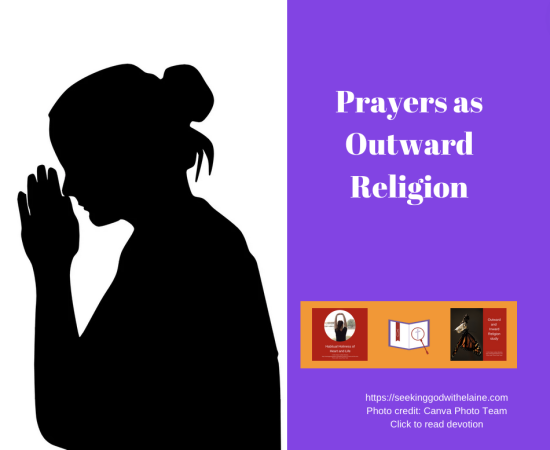Prayer is an important duty for disciples. This devotional reading looks at how prayers can focus on outward religion.
Nuggets
- We are called to give our best to God and shouldn’t be surprised that our prayer life suffers when we don’t.
- Our prayers must be humble and contrite, offered in the way found acceptable by God, not as sacrifices.
- We must conduct our prayer lives not as the Israelites performed their sacrifices but through inward devotion.

Boston had been discussing inward and outward religion. His next point has to do with faulty prayer.
Boston wrote, “In the different acceptance which persons’ prayers get. Some are very pleasing, others God abhors (Proverbs 28:9; Isaiah 66:2, 3; Isaiah 1:11).
Resource
Let's Put It into Context
To read devotions in the Habitual Holiness of Heart and Life theme, click the button below.
Here is a running list of nuggets for the theme.
Devotions in the Outward and Inward Religion study
Here is a running list of nuggets for the study.
We are using Boston’s sermon as the foundation for this series.
Resource
The Connection between the Law and Prayer
“If one turns away his ear from hearing the law, even his prayer is an abomination.” (Prov. 28: 9 ESV)
We are called to give our best to God and shouldn’t be surprised that our prayer life suffers when we don’t.
One of the duties we have to God when we accept His gift of salvation is to continue to hear His laws and commandments. Notice, this verse is Proverbs talks about hearing His law, not doing the law.
There are several ways we can hear about God’s laws and commandments. We read it in His Word. We can listen to the Pastor Steve-types proclaim it.
Many times, we hear it through the promptings of the Holy Spirit. This internal prompting teaches us about what those laws are.
Another duty we have is to remain in communication with God through prayer. We grow closer to Him as we talk to Him daily.
Look closely at what this verse is saying. If we stop hearing the law, our prayer life will suffer.
But isn’t that the progression? We take the focus off of hearing what we should be doing. Pretty soon, we are doing the opposite.
Moffat explained the importance of listening this way. He wrote, “Man, as a fallen being, with alienated affections, debased tendencies, and distorted views, required precise directions as to his future course.”
Resource
We’re not going to get it on our own. We have to be told about God’s ways because His ways are higher than ours (Isa. 55: 8-9).
Doesn’t that throw everything in a worldview person’s face? They think they can figure things out on their own. (You know they are more than likely not going to truly read God’s Word. So, they don’t heart it.)
Our lack of hearing and disobedience does not lower God’s standard. It isn’t based on what we want or what we think we can do.
God has set His laws and commandments based on His character.
Why doesn’t God lower His standards when He finds out we can’t keep His laws and commandments? There are a couple of reasons I can think of.
God can’t change His character. If the laws are based on Him, the standard can’t be lowered.
I don’t see this as much as a condition as an expectation and a connection. We said about two devotions ago that God wants our whole commitment. Prayer without hearing His laws isn’t commitment.
We talk a lot about motivation. Henry said that was the foundation of what God found unacceptable. He wrote, “The sinner whose prayers God is thus angry at is one who [willfully] and obstinately refuses to obey God’s commandments, who will not so much as give them the hearing, but causes his ear to decline the law, and refuses when God calls. God will therefore justly refuse him when he calls.”
Resource
The motivation was stubborn and persistent disobedience. It isn’t that we don’t listen sometimes or forget to pray.
It is we choose to do the exact opposite of what God wants from us.
We have to choose for or against God.
The Connection between Sacrifices and Prayers
“All these things my hand has made, and so all these things came to be, declares the Lord. But this is the one to whom I will look: he who is humble and contrite in spirit and trembles at my word. “He who slaughters an ox is like one who kills a man; he who sacrifices a lamb, like one who breaks a dog’s neck; he who presents a grain offering, like one who offers pig’s blood; he who makes a memorial offering of frankincense, like one who blesses an idol. These have chosen their own ways, and their soul delights in their abominations” (Isa. 66: 2-3 ESV)
Our prayers must be humble and contrite, offered in the way found acceptable by God, not as sacrifices.
Our character must show through our prayers. That character must be like God’s.
If we don’t have humility, we don’t have religion. Why?
Humility is important because it leads to self-denial. Self-denial is the giving up anything that is contrary or in competition with that which Jesus teaches or calls us to do.
Religion isn’t true religion if we do not give up what is contrary to what Jesus teaches. Those contrary things must be replaced by a contrite heart. We know we are insufficient.
God has the power to make us humble and give us a contrite heart. He looks on us in acceptance.
When we are contrite in spirit, we tremble at God’s Word. No, it doesn’t mean we are necessarily afraid.
It means we are in awe of His power and what He can accomplish. “For nothing will be impossible with God” (Lk. 1: 37 ESV).
Spurgeon gave us a list of reasons why we tremble. We tremble because of His majesty, at His Word, at the threatening word, fear of breaking God’s law, and fear of missing the promises.
Resource
I know verse 3 is talking about sacrifices. We talked about sacrifices and how they had taken a wrong turn.
But we can apply that to prayer.
- If we offer to God a prayer that is not acceptable, we are killing our relationship with Him.
- Offering unacceptable prayers is as bad as breaking Fido’s neck.
- We can’t substitute what we consider is a good prayer and think God will just have to accept it.
- We can’t pretend we are praying to God but be putting our affections on worldview things.
Our sacrifices – as our prayers – if done in the wrong way, are not acceptable to God.

Inward Rather than Outward
“What to me is the multitude of your sacrifices? says the Lord; I have had enough of burnt offerings of rams and the fat of well-fed beasts; I do not delight in the blood of bulls, or of lambs, or of goats.” (Isa. 1: 11 ESV)
We must conduct our prayer lives not as the Israelites performed their sacrifices but through inward devotion.
In this verse, we are still talking about sacrifices. It doesn’t say anything about prayer. The verse says nothing about inward religion, either.
Instead, it has to do with outward religion.
It seems like the sacrifices weren’t being performed correctly. They had turned into an outward religion.
Listen to what Henry said. He wrote, “If God’s Word be not regarded by us, our prayers shall not only not be acceptable to God, but they shall be an abomination to Him; not only our sacrifices, which were ceremonial appointments, but even our prayers, which are moral duties, and which, when they are put up by the upright, are so much His delight.”
Resource
Let’s roost on the word abomination. God abhors His Will not being done.
But God delights when we do follow His Will.
Reading reminded us of something about sacrifices. He wrote, “GOD COULD NOT ABSOLUTELY REJECT SACRIFICES, because they were of His own appointing, as we are abundantly certified in the Books of Exodus and Leviticus.”
Resource
God had the sacrifices for a purpose. We all know that sacrifices taught them – and us – that blood needed to be shed for remission of sins.
There was another purpose. They were to build a communion with God.
That is what prayer does.
That tells us that sacrifices and prayer themselves are not wrong. It is the way in which they are done and offered that God finds them an abomination.

Making the Connections
“Thus says the Lord: ‘Heaven is my throne, and the earth is my footstool; what is the house that you would build for me, and what is the place of my rest?’” (Isa. 66: 1 ESV)
We need to pray to God the way He requires. We want to follow His Will in all things.
We don’t want our religion to be an outward only. We want our sacrifices and offerings of prayer correct so that our hearts can be transformed.
We know that God look at the inside and not at the outside. “But the Lord said to Samuel, ‘Do not look on his appearance or on the height of his stature, because I have rejected him. For the Lord sees not as man sees: man looks on the outward appearance, but the Lord looks on the heart’” (I Sam. 16: 7 ESV).
But it isn’t a lukewarm heart. Drive explained. He wrote, “… Jehovah’s regard was not to be won by the magnificence of a material temple, but by humility and the devotion of the heart.”
Resource
But aren’t outward actions easier than inward transformations? That is one reason why it is done so often.
Nothing said being a disciple would be easy!
How Do We Apply This?
- Be humble in our lives as disciples.
- Don’t think we are better or worse than others.
- Don’t make our humility about self-conceit.
- Be poor in spirit.
Resource
Father God. We want our prayers to be genuine and proper for You. We want our devotion to be at the heart level. We want to live for You. Amen.
What do you think?
Leave me a comment below (about this or anything else) or head over to my Facebook group for some interactive discussion.
If you don’t understand something and would like further clarification, please contact me.
If you have not signed up for the email providing the link to the devotions and the newsletter, do so below.
If God has used this devotion to speak with you, consider sharing it on social media.